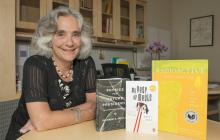Can Technologies Be Monstrous?12
Apr 8, 2018This year marks the 200th anniversary of Mary Shelley’s brilliant novel, Frankenstein. So it’s a good time to ask: can technologies be monstrous? Can human beings create devices and platforms that run beyond our intentions and out of our control? What dangerous technologies may be lurking on the horizon?

Comments (1)
Harold G. Neuman
Thursday, March 22, 2018 -- 11:20 AM
I mentioned, in a comment onI mentioned, in a comment on another post concerning youth issues, that I was reading Rachael Carson's SILENT SPRING. Now, this is only somewhat related to monstrous technology, but it fits --in that 'somewhat related' way. (I have commented on the Shelly/Frankenstein issues before...) Thinking about the totality of circumstances surrounding the technology matter (yesterday and today), I am sort of glad I did not read Carson's fine book when I was much younger.
Why? Well, it paints a grim picture of a futurity tainted by the effects of chemical warfare on insects and other pests, showing how beneficial birds, fish, mammals,insects, worms and plants were being devastated by such things as heptachlor; DDT; DDE; aldrin dieldrin and other poisons. The picture was pretty awful and I am certain I would have found it distressing as an idealistic teenager. Some of Carson's fears were real enough, and her imagery (mostly based on fact) is enthralling in its gruesome way. But, even so, and even with the extinctions which may have occurred, life on earth has yet found a way.
We still have Eagles, albeit fewer than we might like. We still have Robins, Cardinals, Salmon, Albatross, Earthworms and Dutch Elm disease. We should thank the late Ms. Carson for her war on chemicals. Big Chemical hated her and all she stood for. But, through persistence, and facing her own imminent death (from metastatic breast cancer) she wrote a book that made a difference. Are chemicals any 'safer' now? Probably not much, but, hey, we are still here and monstrous technology has not won. So far, so good...